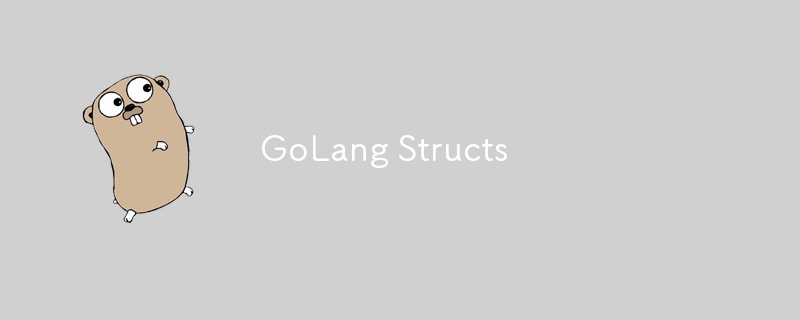Go 语言结构
- WBOYWBOYWBOYWBOYWBOYWBOYWBOYWBOYWBOYWBOYWBOYWBOYWB原创
- 2024-08-30 06:41:06716浏览

在 Golang 中,结构体是简单的数据容器。
- 可以有字段
- 没有附加任何方法
- 单独定义并与结构类型关联的方法。
下面显示了 Ruby 和 GoLang 中的一个简单的 Book 类等效项。
class Book
attr_reader(:title, :author)
def initalize(title, author)
@title = title
@author = authoer
end
end
# usage
book = Book.new('Title', 'Jon Snow')
// Equivalent to `class Book` in ruby
type Book struct {
Title string,
Author string
}
实例化 GoLang 类型
复合文字
复合文字是一步创建初始化复合类型的语法。我们可以实例化以下类型:
- 结构
- 数组
- 切片
- 地图
这里我们将一个新的 Book 实例分配给变量 book
// Composite Literal
book := Book{
Title: "Title",
Author: "Author"
}
使用新关键字
较长的形式是使用 new 关键字。这类似于我们在 Ruby 中使用 book = Book.new(..)
实例化一个类的方式我们将使用 = 符号分配书籍的属性(即标题和作者)。
// Using the `new` keyword book := new(Book) book.Title = "Book Title" book.Author = "John Snow"
没有短变量声明 (:=)
注意到我们在第一个示例中使用了符号 := 吗?
它是以下声明变量并为其赋值的详细方式的语法糖。
// Without Short Virable Declaration // Example 1 var book Book // Declare variable `book` of type `Book` book.Title = "Book Title" // Assign the value to book variable book.Author = "John Snow" // Example 2 var count int count = 20
工厂功能
当我们需要时,我们还可以使用工厂模式来简化结构体的初始化:
- 添加额外逻辑
- 添加默认值
假设我们希望将书名和作者标记的每个第一个字符大写。
// Factory Function
func NewBook(title string, author string) Book {
return Book{
Title: titlelise(title), // default logic to "titlelise"
Author: titlelist(author)
}
}
func titlelise(str string) {
caser := cases.Title(lanaguage.English)
return caser.String(str)
}
将函数附加到结构体
在 Ruby 中,我们只需在类中定义一个函数即可。在这里,我们定义一个名为 to_string() 的函数来打印书名作者。
class Book
attr_reader(:title, :author)
def initalize(title, author)
@title = title
@author = authoer
end
# new function we added
def to_string()
put "#{title} by #{string}"
end
end
在 GoLang 中,我们通过将结构传递给函数来“附加”函数。
// Equivalent to `class Book` in ruby
type Book struct {
Title string,
Author string
}
// Attaching the function to the `struct`
func (book Book) ToString() string {
return fmt.Sprintf("%s by %s", book.Title, book.Author)
}
// Usage
book := Book{
Title: "Title",
Author: "Author"
}
book.ToString()
// => Title by Author
解释:
func (book Book) ToString() string
| Token | Description |
|---|---|
| func | function keyword |
| (book Book) | Attaching the function to the type Book struct - book: variable to access the struct within the function - Book: type of the struct |
| ToString() | name of the function |
| string | return type of the function |
以上是Go 语言结构的详细内容。更多信息请关注PHP中文网其他相关文章!
声明:
本文内容由网友自发贡献,版权归原作者所有,本站不承担相应法律责任。如您发现有涉嫌抄袭侵权的内容,请联系admin@php.cn

